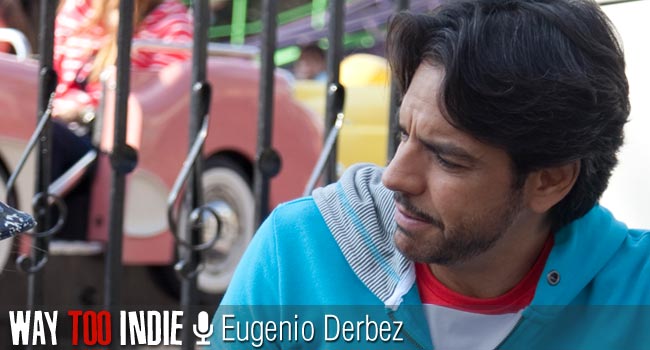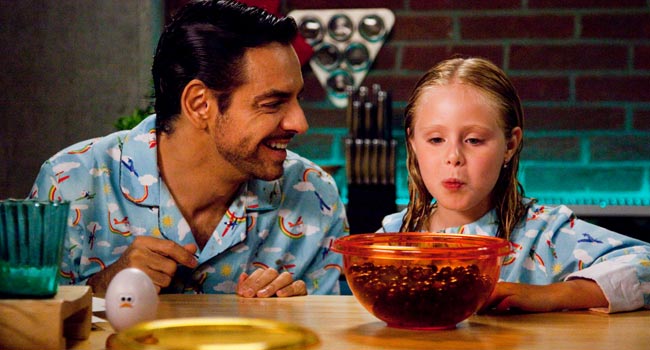Interview: Eugenio Derbez of Instructions Not Included

Hailing from Mexico City, Eugenio Derbez is one of the most prominent and beloved figures in Mexican television and cinema today, and one of the most recognizable actors to Spanish-speaking Americans. He’s in the process of crossing over and showing English speaking audiences what he can do as an entertainer.
Instructions Not Included, his directorial debut (he also stars), is a shining example of his capabilities. When a young ladies man (Derbez) is handed a baby girl at his doorstep by an old fling (Jessica Lindsey), he’s forced to move to California, face the fears of fatherhood, and raise his daughter (Loreto Peralta) the best way he knows how.
Derbez chatted with us about the fears of directing, casting on Twitter, the 12 year history behind the film, and more.
Instructions Not Included opens this Friday, August 30th in San Francisco
You’re an expert comedian, one of if not the most successful in Mexico. That being said, the film—which is very funny—ends up taking an unexpected turn away from humor. If someone were to say, “I want to go out and see a comedy tonight,” would you suggest your film?
I really wanted to make a comedy that touches your heart. When you go to movies to see a simple comedy, you’ll laugh, but nothing happens. Those memorable films like Life is Beautiful for example, are full of comedy, but have a lot of heart. You keep [those films] for the rest of your life. I really wanted to put a lot of heart, not just laughs, on the screen.
Was it always your intent to direct the film?
No, no. Absolutely not. I was [just planning on acting.] I was writing this film 12 years ago because I wanted to do a “tailored suit” movie. It was planned for me as an actor. After ten years of working on this film, going over and over the script, I realized the only person who knows the script best is me. That’s why I decided to direct it, and in the end it was worth it. Everything I dreamed of in the script is on the screen.
One of the big themes of the film is fear. Was directing the film your biggest fear going into the project?
I remember the first day I walked onto said. You can’t imagine how scared I was. But I didn’t tell anyone. I didn’t show my fear because I was the director and I needed to have the respect of all my staff. I had to stay strong, so I didn’t show my fear. It was really, really scary, the fact that I was directing the film, but especially that I was acting and directing at the same time. It was really hard.
Is your relationship with your movie daughter, Maggie (Peralta), reflective of your relationship with your real-life daughter?
Absolutely. Absolutely. A lot of the scenes are based on my life. My daughter was my first kid ever, and I was scared. I remember the first time I [found out] I was going to be a father, I didn’t want it. I didn’t want to be a father. I thought my career was going to end, my plans were going to end at that very moment. I didn’t want it. After two years I realized that fatherhood is amazing, the best present that life gave me. I put a lot of my personal life and relationships on the screen.
In the original script you had a son, not a daughter. When you made the change and cast Loreto, did the script change significantly?
We had to adapt a few things. Not that much. The first 11 years of writing the script, it was planned to be a boy. After all this time, we started looking for the actor to play the kid. It was really hard because it had to be a 6 to 7-year-old kid with blonde hair with blue eyes, a lot of charisma, and was able to speak perfect Spanish and perfect English. It was really hard to find [an actor.] After three or four months looking everywhere, we didn’t find [the kid,] so we opened up the option of [casting] a girl. We read the script again, and we realized that, with changes, it could be a girl. We didn’t find any [girl actors,] so I started to tweet that I needed a girl or boy with all of these [qualities.] Finally, I found Loreto through Twitter. It was really amazing.

Wow, so you used Twitter to cast one of the main roles!
Yeah! She’s not in show business at all.
Did Loreto ever meet your actual daughter?
Yeah! I have a picture of both of them. My daughter came on set one day, so I have a picture of my two daughters. (laughs)
One thing I really appreciated about the film is that Jessica Lindsey’s character (she plays Maggie’s mother in the film) is the main source of conflict, but she’s never demonized.
We worked a lot on the script. [In early versions,] you ended up hating her. We realized it was not healthy for the script to put her on that side. She was a complete villain, and you hated her. She really was a bitch. We changed some things. We gave some lines of hers to her girlfriend and made her character a little bit sweeter and a little more human. She’s a mother. She made a mistake. But she came back to fight for her daughter, and now she wants to be a good mother for the girl. It was difficult to find that balance.
The film’s ending is very, very powerful. Did you have that ending in mind when you started writing the script 12 years ago?
We realized we needed another twist to make [the ending] more powerful. There are a lot of twists at the end, but we needed a last one. I think we got it. It’s a killer. I think it’s one of the strengths of the film. The last five, ten minutes are really strong.
You do a lot of stunts in the film. Did you get hurt at all?
No, nothing important. Just a few scratches. I think it was important to do all of the stunts. It had to be me doing the stunts to make it real. I enjoyed it. I was really scared because my life was dependant on a very thin cable (laughs) but it was fun.
